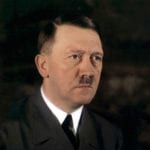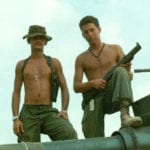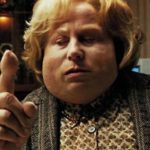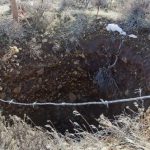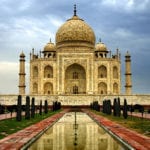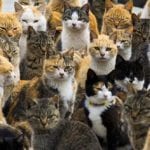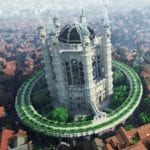 Movies and TV
Movies and TV  Movies and TV
Movies and TV  Health
Health 10 Miraculous Advances Toward Curing Incurable Diseases
 Miscellaneous
Miscellaneous 10 Undeniable Signs That People’s Views of Mushrooms Are Changing
 Animals
Animals 10 Strange Attempts to Smuggle Animals
 Travel
Travel 10 Natural Rock Formations That Will Make You Do a Double Take
 Movies and TV
Movies and TV 10 Actors Hidden in Your Favorite Movies
 Our World
Our World 10 Science Facts That Will Change How You Look at the World
 Pop Culture
Pop Culture 10 Incredible Female Comic Book Artists
 Crime
Crime 10 Terrifying Serial Killers from Centuries Ago
 Technology
Technology 10 Hilariously Over-Engineered Solutions to Simple Problems
 Movies and TV
Movies and TV 10 Movie Adaptions That Brought Popular Songs to Life
 Health
Health 10 Miraculous Advances Toward Curing Incurable Diseases
 Miscellaneous
Miscellaneous 10 Undeniable Signs That People’s Views of Mushrooms Are Changing
Who's Behind Listverse?

Jamie Frater
Head Editor
Jamie founded Listverse due to an insatiable desire to share fascinating, obscure, and bizarre facts. He has been a guest speaker on numerous national radio and television stations and is a five time published author.
More About Us Animals
Animals 10 Strange Attempts to Smuggle Animals
 Travel
Travel 10 Natural Rock Formations That Will Make You Do a Double Take
 Movies and TV
Movies and TV 10 Actors Hidden in Your Favorite Movies
 Our World
Our World 10 Science Facts That Will Change How You Look at the World
 Pop Culture
Pop Culture 10 Incredible Female Comic Book Artists
 Crime
Crime 10 Terrifying Serial Killers from Centuries Ago
 Technology
Technology 10 Hilariously Over-Engineered Solutions to Simple Problems
Ten Unbelievable Final Resting Places (Maybe) of Drug Lords
Drug lords must live by the proverbial sword. Often they die by it too. Cartel leaders and local drug runners know the nature of their business. Those at the top must be ruthless to retain power. When it all ends, many kingpins enter the afterlife on their own terms. With untold wealth earned during their lives, some of these smugglers spared no expense in death. Others entered the afterlife amid mystery and conspiracy. But they all left a mark as they left this realm.
So let’s look at how these drug lords met their end and where to find their final resting places—maybe.
Related: Top 10 Bizarre Ways People Smuggled Drugs
10 Felix Mitchell
Felix Mitchell was a street legend in Oakland, California. “Felix the Cat” turned a local heroin hustle into a drug empire that earned millions. By the 1980s, he was infamous for ruthless violence. Police claimed he killed or ordered the deaths of six people. Prosecutors caught up to him, though, and by 1985 he was imprisoned. The following year, Mitchell was stabbed to death by another inmate. His murder came two days before his 32nd birthday.
Mitchell’s funeral made headlines across the world. His two-hour funeral procession featured a horse-drawn carriage, Rolls Royces, and limousines. Ushers and attendees wore tuxedos. Mitchell’s coffin cost more than $6,000. City officials condemned the celebration, but nearly 2,000 people attended the funeral. Thousands more lined the streets to watch as Mitchell was taken to his resting place in the nearby city of Richmond.[1]
9 José Gonzalo Rodriguez Gacha
José Gonzalo Rodriguez Gacha was brutal to his enemies but helpful to his hometown. The Colombian drug lord was beloved for funding various public projects in the city of Pacho. In 1989, the Medellin cartel underboss and his son were killed in a shootout with police. They were buried, but two days later, their bodies were exhumed and returned to Pacho. When Gacha’s body arrived home, 15,000 people took to the streets to mourn their local hero. After the public procession, the kingpin’s family held a private late-night funeral. Gacha was reportedly buried in an intricate wooden coffin.
Over the next few years, residents of Pacha started noticing a man in town who looked a lot like Gacha. The mystery man was said to have even attended the drug lord’s birthday memorial. Locals whispered that the funeral was suspicious for being held late at night and with a closed coffin. Ever since, many have wondered if Gacha faked his death.[2]
8 Amado Carrillo Fuentes
Amado Carrillo Fuentes was known as the “Lord of the Skies” in his life. The drug runner was famous for using private jets to transport cocaine. The Juarez cartel leader’s sudden death in 1997 shocked the world: it came during plastic surgery.
Supposedly, the kingpin had been altering his appearance to escape justice. Fuentes’s final resting place in Mexico’s Culiacán state is incredible. The three-story mausoleum cost more than $415,000. It holds a 50-seat chapel and two burial chambers. But it may not hold Fuentes. Investigators have always wondered whether the secretive drug lord is really inside. Rumors swirl that one of his henchmen lies there instead. A few months after his funeral, the mystery deepened when the corpses of Fuentes’s plastic surgeons were discovered in barrels of concrete.[3]
7 Ramón Arellano Félix
In life, Ramón Arellano Félix spent years on the FBI’s Most Wanted Fugitive List, right next to Osama bin Laden. But the long arm of the law found Félix by the end of 2002. That year, Mexican cops tracked down the Tijuana cartel boss and killed him in a shootout. At least they thought they killed the dangerous drug runner. The man thought to be Félix was carrying an ID card that claimed he was “Jorge Pérez Lopez.”
Authorities prepared to investigate further when someone claiming to be a family member of the deceased took the body from the funeral home. The corpse was quickly cremated before police could step in. Félix—or whoever—was lost to history. Police did the next best thing, testing DNA from blood left on the dead man’s clothes. When tests came back, cops announced they were “virtually certain” the dead man was Félix. But with no air-tight confirmation, the mysterious cremation continues to baffle.[4]
6 Arturo Beltrán Leyva
Arturo Beltrán Leyva was known as “The Boss of Bosses” during his career smuggling cocaine from Mexico to the United States. His luck ran out in 2009 when he was killed by Mexican forces in a surprise raid on his compound near Mexico City. Distraught supporters hired a private jet to fly his body back home to Culiacán state. His funeral was an unusually low-key affair. To avoid police harassment, no men attended the event.
While Levya’s memorial may have been small, his trip to the afterlife was not. The drug lord’s two-story mausoleum is said to resemble a mansion. The tomb has two bedrooms and a kitchen. It is filled with Leyva’s memories, as well as guns, cars, and other things he owned in life. It even has satellite TV, air conditioning, and a Wi-Fi connection.[5]
5 Heriberto Lazcano
Heriberto Lazcano was a Mexican Special Forces soldier who switched sides. He became a valuable assassin for the Gulf Cartel when he was killed in a shootout in 2012. Cops took fingerprints and DNA samples after his death. But days later, the corpse was stolen from a funeral home.
The Mexican government was adamant they killed Lazcano. They even dug up the graves of the hitman’s parents to confirm a DNA match. However, the results are sealed until 2024. If Lazcano really was the one killed, his path to the afterlife has been unique. The cold-blooded murderer reportedly rests in an exquisite three-story mausoleum with a “heavy religious theme” in his native Culiacán.[6]
4 Griselda Blanco
Griselda Blanco was one of the most prolific cocaine smugglers ever. But a 15-year prison sentence in the United States followed by the 2004 deportation back to her native Colombia ended her trafficking career. Once back home, Blanco enjoyed retirement. But in 2012, she was assassinated in a local butcher shop by a passing motorcyclist. Ironically, it was Blanco who first pioneered the use of motorcycle assassins during her violent career.
Two days later, she was buried in the same cemetery as rival kingpin Pablo Guzman. Thousands of schoolchildren from across the city of Itagüí were bussed in for the funeral. Adult mourners shared bottles of liquor at her grave for hours. Everyone in town was there except her son, Michael Corleone—yes, named after The Godfather character—who was under house arrest for drug crimes of his own.[7]
3 Nazario Moreno González
The Mexican government triumphantly announced that drug lord Nazario Moreno González was killed in a shootout in 2010. But the co-head of the La Familia cartel wasn’t dead. Four years later, authorities claimed he had been killed—again. They got it right the second time. The man known as “El Mas Loco” or “The Craziest One” had actually been shot and killed that time. Police held González’s body until it was confirmed to be him through forensic analysis. At that point, they released the corpse to family members.
During life, González was god-like. The cartel boss dressed in flowing white robes. Followers hung on to his every word. Some even venerated the drug lord as if he were a saint. But in death, he disappeared. Family members refused to say where they buried the kingpin. Rumors have persisted that he was cremated. His final resting place has never been confirmed.[8]
2 Héctor Beltrán Leyva
Héctor Beltrán Leyva took over the family business after his brother Arturo was killed in 2009 (See #6). But while Arturo lived a notorious life and was given a flashy burial, Héctor’s end was less boastful. The younger Beltrán Leyva brother, known as “El H,” ran the family cartel until his 2014 arrest. In 2018, while in jail awaiting trial, the drug lord died of a heart attack.
Family members insisted on complete privacy after his death. Héctor’s body was flown back to his hometown of Hermosillo on a private jet. Once there, it was guarded by security personnel in a private wing of the city mortuary. From there, the burial story runs cold. The cartel boss’s final resting spot has never been revealed.[9]
1 Frank Lucas
Frank Lucas served as the inspiration for Denzel Washington’s 2007 movie American Gangster. And the real-life crime boss’s life story was worthy of the silver screen. In the 1970s, Lucas became one of America’s most successful drug lords. He controlled the heroin market on the east coast, importing massive amounts of the drug from Southeast Asia. Against all odds, Lucas later left organized crime and lived well into his 80s.
Not long before Lucas died, he ordered a custom-made casket for his own burial. The design was based on a Cadillac CTS-V, with a sliding rooftop window and all the accessories. The custom coffin cost $12,000. When the ex-drug lord passed, he was buried in a well-attended ceremony. His nephew, a pastor, presided over Lucas’s funeral. The man of God acknowledged Lucas’s actions but commended the ex-gangster for working to help others avoid crime at the end of his life.[10]
